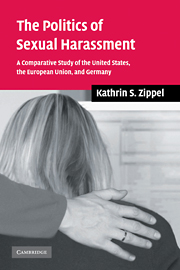 The Politics of Sexual Harassment
The Politics of Sexual Harassment Book contents
- Frontmatter
- Contents
- List of tables
- Preface
- List of abbreviations
- 1 Sexual harassment and gender equality
- 2 Equality through litigation: sexual harassment in the United States
- 3 Diffusion through supranational actors: sexual harassment in the European Union
- 4 The political path of adoption: feminists and the German state
- 5 “Good behavior versus mobbing”: employer practices in Germany and the United States
- 6 Social movements, institutions, and the politics of sexual harassment
- Appendix A List of cited interviews
- Appendix B Data collection
- References
- Index
2 - Equality through litigation: sexual harassment in the United States
Published online by Cambridge University Press: 22 September 2009
- Frontmatter
- Contents
- List of tables
- Preface
- List of abbreviations
- 1 Sexual harassment and gender equality
- 2 Equality through litigation: sexual harassment in the United States
- 3 Diffusion through supranational actors: sexual harassment in the European Union
- 4 The political path of adoption: feminists and the German state
- 5 “Good behavior versus mobbing”: employer practices in Germany and the United States
- 6 Social movements, institutions, and the politics of sexual harassment
- Appendix A List of cited interviews
- Appendix B Data collection
- References
- Index
Summary
“The development of law against sexual harassment, and its transformation from private joke to public weapon, is one of the more successful legal and political changes women have accomplished.”(Catharine MacKinnon 2002: 12)
The United States was the first country in the world to recognize sexual harassment as sex discrimination, and today probably has the most sophisticated legal and institutional apparatus to handle such complaints in the workplace and the legal system. It is important to note that although there is a public perception that sexual harassment law has gone too far, in fact it is by no means as broad as most people think it is – not only the European but also the US public is frequently misled by misconstrued and exaggerated interpretations of the reach of the law. Feminist advocates and legal scholars, however, are concerned that sexual harassment laws have not gone far enough, as they still invite sexist interpretations and possibly unfair applications of the law. Feminists continue to debate the pitfalls, weaknesses, and problems of sexual harassment laws and their applications (MacKinnon and Siegel (eds.) 2004).
Despite the criticism against the law from many sides, the revolution of sexual harassment law in the United States can be considered a feminist success story (Brownmiller 1999). The US law reflects and is deeply influenced by feminist legal arguments; most importantly, US courts have accepted a definition of sexual harassment from the victim's perspective – as unwanted sexual behavior – or, as Gwendolyn Mink put it, “the law begins with a woman's word” (2000: 4).
- Type
- Chapter
- Information
- The Politics of Sexual HarassmentA Comparative Study of the United States, the European Union, and Germany, pp. 42 - 81Publisher: Cambridge University PressPrint publication year: 2006


